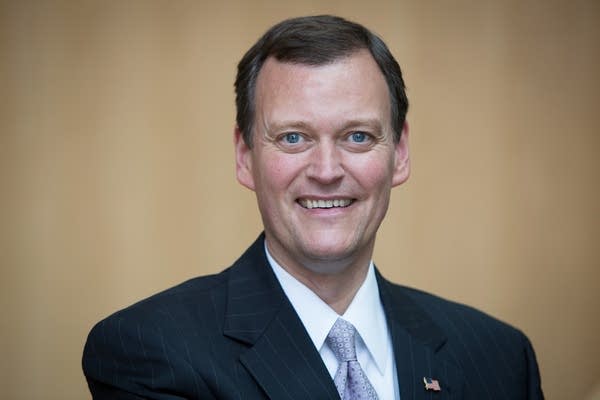On primary eve, GOP governor hopefuls play to their strengths

Republican voters will pick a nominee for governor on Tuesday. It's the first time in 20 years that the endorsed Republican candidate is facing a stiff primary challenge.
Related coverage:
• Primary 2014: Who's your candidate?
• More Election 2014 coverage from MPR News
No one is quite sure who will win and go on to challenge DFL Gov. Mark Dayton in November. The four major candidates -- Jeff Johnson, Scott Honour, Marty Seifert and Kurt Zellers -- don't differ much on the issues so they've been using their experience to highlight their differences. And they've been spending a lot of time trying to stitch together enough support to win on Tuesday. Here's one more look at who they are and what they hope to do.
Create a More Connected Minnesota
MPR News is your trusted resource for the news you need. With your support, MPR News brings accessible, courageous journalism and authentic conversation to everyone - free of paywalls and barriers. Your gift makes a difference.
Jeff Johnson

Jeff Johnson has been appearing at traditional Republican Party events. He won the party endorsement in June and needs volunteers to make phone calls and knock on doors to help him win.
"I want to thank you for everything that you're doing for our ticket and for the party and for me personally, both in the primary and the general," he said during a recent office opening in Eagan.
"By the way, I'm treating them as one in the same. We didn't leave Rochester and launch a primary campaign against three other Republicans. I launched a campaign against the most incompetent governor in the United States."
Johnson served in the Minnesota House from 2000 until 2006. He was elected Hennepin County Commissioner in 2008. He ran for Minnesota attorney general in 2006 and lost by a wide margin. Despite criticism that he hasn't proven he can win a statewide race, Johnson said he learned from his failed bid.
"I think probably more so than anyone else in the race, I understand how to run a statewide race and what Minnesota looks like from a political standpoint at least."
Johnson's opponents have also criticized him for his suggestion that he'd be open to expanding the sales tax. But he says he would only support it if other taxes were cut.
"My general philosophy is low, broad and simple and I think most economists would agree with that," he said. "Minnesota's system is high, complex and narrow. We're exactly the opposite of where we should be."
Marty Seifert

Republicans have traditionally agreed to drop out of the race if they don't win the endorsement from state convention delegates. That's what Marty Seifert did four years ago when he stepped aside and backed Tom Emmer.
But this year, Seifert isn't backing down. He cited statistics saying other candidates won despite not having the endorsement.
"When people pooh pooh the idea that you can't get through the process at the convention, Minnesota voters have said otherwise," he said recently at the Anoka County Fair.
Seifert has been relying on a grassroots strategy to win Republican votes. He's campaigned at county fairs, in coffee shops and at senior centers. He has been spending the bulk of his time in rural Minnesota, hoping that rural senior citizens who traditionally vote in heavy numbers in primaries will cast their ballots for a candidate who lived his entire life outside the Twin Cities.
"Every vote counts. And when people say, 'He went into the cafe in Alexandria and there were only 32 people there,' you know what, we asked those guys last week and every one of them said they were voting in the primary. And most, if not all, are going to vote for me, because we took the time to come and talk to their coffee club," he said.
Seifert has rubbed some Republicans the wrong way. He made a play for the party endorsement in May but walked out of the convention after it was clear he wasn't going to win. Delegates and party leaders were enraged that his move to exit with his supporters could have deadlocked the convention.
A few Republican legislators also traded barbs with Seifert when he was House minority leader from 2006 through 2009. He left that position during his first run for governor. And the person who replaced Seifert in House leadership is also on the Aug. 12 ballot.
Kurt Zellers

State Rep. Kurt Zellers of Maple Grove is using his work in the Legislature to his advantage. And he's basing part of his playbook on what helped Tim Pawlenty win in 2002 -- a pledge not to raise taxes.
"After what we've seen the last two years, Minnesotans need to know going in before they elect a governor that they won't raise taxes," he said. "I have made that commitment in the past."
That past is when Zellers served as House speaker in 2011. That year, Zellers and other Republicans in the Legislature refused Gov. Dayton's demands to raise taxes to balance the state budget.
Zellers is telling voters that he won that staredown.
"I think Republicans are looking at this and saying 'who's the guy who faced down Gov. Dayton and balanced the budget when he said it couldn't be done?'"
But Zellers failed in his attempt to maintain Republican control of the House in 2012. Democrats won in part by blaming Republicans for the government shutdown.
Voters also rejected constitutional amendments to ban same-sex marriage and require people to show a photo ID to vote. As Speaker, Zellers had a big say in placing those measures on the ballot. But now he contends the shutdown and he ballot initiatives had little to do with Republicans losing the House.
"When you have a presidential candidate that has a poor showing and your political opponents have twice as much money as you do, there's a lot of issues that aren't going to raise the flag other than those two things. I think that more than anything is why we unfortunately lost."
Zellers left his leadership position in 2012 after Republicans lost the majority.
Scott Honour

While Zellers is playing up his role as a government insider, Scott Honour is campaigning as a complete outsider.
Recently at the Scott County Fair, Honour shook hands with people as they ate at picnic tables. The southwest Twin Cities suburb is a Republican stronghold where words like pro-life, big government and career politician are rejected. Honour highlighted those themes in his talks with voters.
"We have too many of these career politicians who want to see government get bigger and bigger and bigger and we're not getting better things from it," Honour said. "We need to take it back the other way."
Honour made millions running a global investment company in California before moving back to Minnesota a few years ago. He says his time as a business executive will pay dividends as governor.
"I know from my business experience that you could always find a way to lower costs and get better results, and unfortunately Minnesota is not achieving its full potential today. We want to apply our skills to put the state back on that right track."
Honour says he wants to cut state spending by 10 percent, freeze future minimum wage hikes and cut the overall number of state workers. Despite the fact that the state budget has a surplus and job cuts of any kind could be viewed as political poison, he still says it needs to be done.
"As we fixed those companies around the country over the last decade, we saw that you could always cut administrative costs by at least 10 percent. We did it every single time," he said. "There's no question in my mind that this state is run less effectively than those businesses."
The candidate who wins on Tuesday will have to quickly shift from campaigning for Republican votes to appealing to a wider audience of general election voters.
He will also be forced to campaign against Dayton, a well funded incumbent who has said he will not engage any of the Republicans candidates until they settle on a nominee.